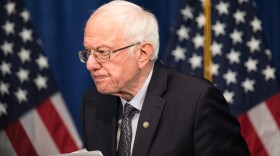Sen. Bernie Sanders' quest to win the Democratic presidential nomination has come a long way since the Vermont senator formally entered the race in late May.
Then, few political observers felt that Sanders would pose much of a threat to former Secretary of State Hillary Clinton to win the nomination.
But many Democratic primary voters have enthusiastically embraced Sanders’ message of income inequality.
In many respects, the presidential primary campaign is now shifting from a marathon to a sprint.
In just five weeks, voters in Iowa will hold their caucuses, and eight days later, New Hampshire will hold its primary.
In late May, Sanders had the support of roughly 5 percent of likely Democratic primary voters.
But then he spent the summer and fall crisscrossing the country calling for "a political revolution" to take on the policies of what he called the "monied interests."
The message struck a nerve in a number of states. The most recent New Hampshire poll shows him leading Clinton by roughly 10 percent and in Iowa he has narrowed her lead to single digits.
The Importance Of African American And Latino Voters
UVM political science professor Garrison Nelson says Sanders needs to reach out to African American and Latino voters if he hopes to be successful.
“Until he starts broadening that base,” Nelson says, “he's not really a threat to Hillary and the proof of it is Hillary is basically ignoring him and going directly after Trump."
Reaching Out To The Working Class
Retired Middlebury College political science professor Eric Davis thinks that Sanders needs to deliver his economic message to a wider demographic audience.
Polls indicate that Sanders' support comes much more from middle class voters and people with college degrees,” says Davis. “The voters he's trying to target, who are working class voters [who] often times people who don't have college degrees, they're breaking more heavily for Hillary Clinton."
Foreign Policy
Davis says recent acts of terrorism in France and in this country have shifted the focus of the presidential campaign away from economic issues. He says this will hurt Sanders if it continues.
“What's happened in the last four to six weeks, because of national and international developments, is foreign policy and national security issues have become much more salient to voters,” Davis says. “And that's an area where Hillary Clinton can point to advantages from her experiences as Secretary of State."
Funding From His Existing Donor Base
The Sanders campaign has just set the all-time record for the most contributions made to a presidential candidate. It's received over 2.3 million contributions and the average donation is roughly $25.
Professor Nelson says this financial base is very important because Sanders doesn't have a "Super Pac" supporting his candidacy. Nelson says the Sanders campaign can also go back to many of these contributors for more money.
“These small donations serve two purposes: One, they continue to provide income for the campaign,” Nelson says. “But more importantly, they indicate the breadth of his support and a willingness of people to pony up cash which is the ultimate contribution that a voter can make."
The South
On March 1, a dozen states will hold their primaries on what is known as "Super Tuesday," including several states in the South.
Davis says Sanders needs to do well in some of these states in order for him to be considered a strong national candidate.
“Let's say he wins in New Hampshire and he wins the Vermont primary on March 1 and he doesn't win anything else,” Davis explains. “He doesn't want to be referred to as just a northern New England candidate, so he has to find some states that are voting on Super Tuesday … or soon after that where he could also be competitive."
Sanders is back out on the campaign trail this week. He'll make a three-day swing in Iowa starting tomorrow and he has plans to visit Nevada later in the week.
Copyright 2015 Vermont Public Radio








